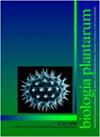Spermine alleviates heat-induced senescence in creeping bentgrass by regulating water and oxidative balance, photosynthesis, and heat shock proteins
IF 0.9
4区 生物学
Q4 PLANT SCIENCES
引用次数: 7
Abstract
Spermine (SPM) is involved in response to abiotic stress in plants, but the potential role of SPM in regulating senescence has not been well documented. Objectives of this study were to examine the effect of changes in endogenous polyamines (PAs) by SPM application on improving heat tolerance of creeping bentgrass (Agrostis stolonifera) and explore the SPM-regulated senescence associated with alterations of water and oxidative balance, photosynthesis, and heat shock proteins under heat stress. The results showed that persistent high temperature caused severe oxidative damage and significant decreases in chlorophyll (Chl) content, photosynthetic efficiency, and leaf water content leading to premature senescence in creeping bentgrass, as reflected by a significant upregulation of transcriptions of senescence-associated genes (AsSAG39, Ash36, and Asl20). The improvement of endogenous spermidine (SPD) and SPM content induced by SPM application could significantly alleviate heat stress damage to creeping bentgrass through maintaining higher Chl content, net photosynthetic rate, photochemical efficiency, and performance index on absorption basis, promoting osmotic adjustment ability and antioxidant enzyme (superoxid dismutase, catalase, peroxidase, and ascorbate peroxidase) activities to enhance the scavenging capacity of reactive oxygen species, and upregulating transcriptions of heat shock protein (HSP) genes (HSP90-5, HSP90.1-b1, HSP82, HSP70, HSP26.7, HSP17.8, and HSP12) helping to maintain normal synthesis and functions of proteins under high temperature stress, thereby delaying heat-induced leaf senescence. These findings reveal an important role of PAs in regulating senescence in perennial plants exposed to a high temperature environment.精胺通过调节水分和氧化平衡、光合作用和热休克蛋白来缓解匍匐草的热致衰老
精子(SPM)参与植物对非生物胁迫的反应,但SPM在调节衰老中的潜在作用尚未得到充分的证明。本研究的目的是通过SPM应用来检测内源性多胺(PA)的变化对提高匍匐草(Agrostis stolonifera)耐热性的影响,并探讨SPM调节的衰老与热胁迫下水和氧化平衡、光合作用和热休克蛋白的改变有关。结果表明,持续的高温导致了严重的氧化损伤,叶绿素(Chl)含量、光合效率和叶片含水量显著降低,导致匍匐底栖草早衰,衰老相关基因(AsSAG39、Ash36和Asl20)的转录显著上调反映了这一点。SPM施用对内源亚精胺(SPD)和SPM含量的提高,可以通过保持较高的叶绿素含量、净光合速率、光化学效率和吸收性能指标,显著减轻热胁迫对匍匐底栖草的损害,促进渗透调节能力和抗氧化酶(超氧化物歧化酶、过氧化氢酶、过氧化物酶和抗坏血酸过氧化物酶)活性,以增强活性氧的清除能力,以及上调热休克蛋白(HSP)基因(HSP90-5、HSP90.1-b1、HSP82、HSP70、HSP26.7、HSP17.8和HSP12)的转录,有助于在高温胁迫下维持蛋白质的正常合成和功能,从而延缓热诱导的叶片衰老。这些发现揭示了PAs在高温环境下多年生植物衰老调控中的重要作用。
本文章由计算机程序翻译,如有差异,请以英文原文为准。
求助全文
约1分钟内获得全文
求助全文
来源期刊

Biologia Plantarum
生物-植物科学
CiteScore
2.80
自引率
0.00%
发文量
28
审稿时长
3.3 months
期刊介绍:
BIOLOGIA PLANTARUM is an international journal for experimental botany. It publishes original scientific papers and brief communications, reviews on specialized topics, and book reviews in plant physiology, plant biochemistry and biophysics, physiological anatomy, ecophysiology, genetics, molecular biology, cell biology, evolution, and pathophysiology. All papers should contribute substantially to the current level of plant science and combine originality with a potential general interest. The journal focuses on model and crop plants, as well as on under-investigated species.
 求助内容:
求助内容: 应助结果提醒方式:
应助结果提醒方式:


